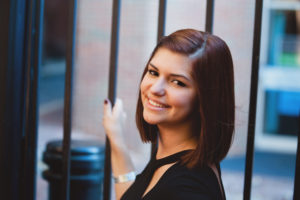CIS Event Reflection by Jessica Horst
Last semester, on Monday, November 6, 2017, the Center for Israel Studies hosted Haim Watzman, a Jerusalem-based writer, journalist and translator, to discuss his latest work, Necessary Stories. After his presentation, Watzman engaged in literary conversation with American University’s Jewish Literature Professor Lauren B. Strauss.

An immigrant to Israel, Watzman was born in 1956 in Cleveland, Ohio and grew up in Silver Spring, Maryland. After receiving a B.A. from Duke University he moved to Israel in 1978 where he began his career. Aside from writing in Israel, Watzman also met his wife, Ilana, and started a family. Currently living in Jerusalem, he is also an active member of Kehilat Yedidya, a liberal Orthodox community equally concerned about democracy in Israeli society and traditional Jewish values.
To begin the presentation, Watzman discussed his new book, Necessary Stories, a collection of 24 short fiction stories from his column in The Jewish Report. This selection of stories features Israeli and Jewish life: the joys, the tragedies, the culture, and the controversies. The scenes are set in immigrant camps, the Israeli army, and the author’s own neighborhood in south Jerusalem, all which uniquely capture what it is like, today, to be an Israeli and a Jew. Bookended by a flashback to his first weekend in Israel forty years ago and a storytelling encounter on a recent flight back home from the US, his stories are funny, meditative, and in some cases, poignant.
Early in his career, Watzman became a translator to sustain his growing family’s finances. Work became a passion, hard to say whether it happened by choice or chance. Now, Watzman translates nonfiction works and is particularly known for his translations of literary works by leading Israeli writers and scholars, including David Grossman, Tom Segev and Amos Oz. As a translator, Watzman said he views himself as an editor who “creates a version of a manuscript that will get the same message conveyed over to a different culture.” Though Watzman weaves intricate fiction stories that reflect history, he chooses to translate predominantly with nonfiction authors.
In general, many fiction writers are hesitant to change their writing styles or envisioned plotline during the translation editing process. On the other hand, non-fiction writers are more apt to revise because they are more concerned about clearly portraying a point of view or a concept to a reader. “Choosing a translator is like choosing a psychiatrist,” Watzman said though, “We argue quite a bit about how messages should be conveyed, and it forces writers to really think critically about their writing in another cultural context. Ambiguous definitions often don’t work.”
Hebrew is a particularly difficult language to translate because words may contain multiple layers of meaning. A translator must think about the layers of cultural association and meaning that each word has, especially when there may be different modern presumptions and differentiating ties to the meaning. Similarly, metaphors often do not translate to other languages since they depend on a communal understanding and popularity. This is where cross-culture communication plays a huge role in translation. As Watzman explained, sections must be carefully rewritten into the language and cultural understanding of another audience to be received as the author intended. This might include a word or phrase translation, as well as an explanation of the subculture in the main text. Many authors even include a glossary of concepts when translating heavily cultural dependent writing.
 Noted by Watzman, the difficulty for young authors is often sharing their opinion confidently with a public audience. In an age where digital writing can be viewed globally, “if someone doesn’t like your opinion,” explained Watzman, “you may be scared that your career could be ruined for the future if the wrong person doesn’t like your work.” Whenever writing academically, writers should diligently research their topic, including opposing views. Perhaps, the editing process should be thought of more as checking the translation of ideas to an audience. Translation is particularly important for cross-cultural communication, but also a testimony to the importance of literary eloquence and word choice.
Noted by Watzman, the difficulty for young authors is often sharing their opinion confidently with a public audience. In an age where digital writing can be viewed globally, “if someone doesn’t like your opinion,” explained Watzman, “you may be scared that your career could be ruined for the future if the wrong person doesn’t like your work.” Whenever writing academically, writers should diligently research their topic, including opposing views. Perhaps, the editing process should be thought of more as checking the translation of ideas to an audience. Translation is particularly important for cross-cultural communication, but also a testimony to the importance of literary eloquence and word choice.
Click Here to View Event Photo Album.

Illustrations by Avi Katz featured in The Jewish Report “Necessary Stories” column by Haim Watzman.
Jessica Horst
Jess is from New Holland, Pennsylvania and a junior Business Administration major with a personalized specialization and a minor in communications. Jess is the Co-Manager of Student Israelity alongside Sophie Levy, but her primary duty for Student Israelity is website maintenance, management, and design. As Head of Communications at the Center for Israel Studies, Jess has developed her interest in Israel’s agricultural and sustainability practices, as well as population statistics.
For any article inquiries, please contact Jessica Horst directly at the email provided: jh5410a@student.american.edu.



